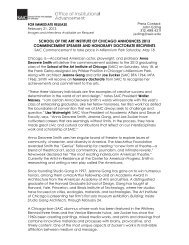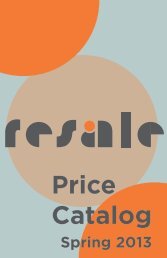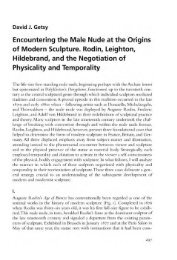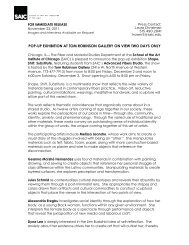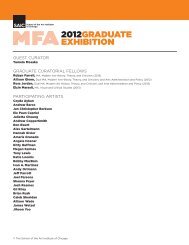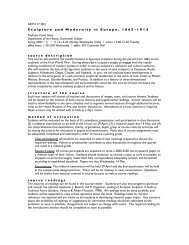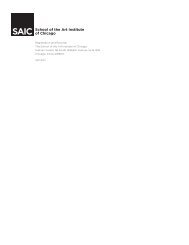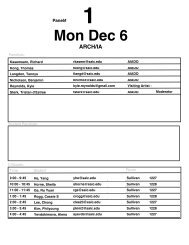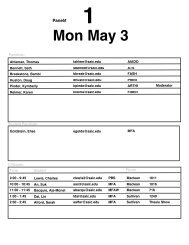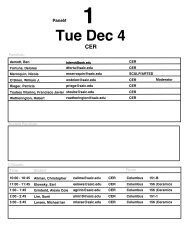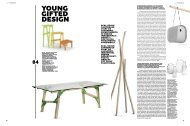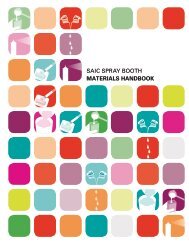i. institutional support and commitment to continuous improvement
i. institutional support and commitment to continuous improvement
i. institutional support and commitment to continuous improvement
You also want an ePaper? Increase the reach of your titles
YUMPU automatically turns print PDFs into web optimized ePapers that Google loves.
School of the Art Institute of Chicago<br />
Department of Architecture, Interior Architecture, <strong>and</strong> Designed Objects<br />
Master of Architecture<br />
Master of Architecture with emphasis in Interior Architecture<br />
Course Number & Title:<br />
ARCH 5120 Architecture Studio 2: Skins (4.5)<br />
Course Description:<br />
This introduc<strong>to</strong>ry design studio examines the role of the<br />
building envelope in architectural design, focusing on its rela-<br />
tion <strong>to</strong> program, site, form <strong>and</strong> materials.<br />
Course Goals & Objectives:<br />
1) Design culture: explore the role of building enve-<br />
lopes in design, integrating ideas about envelopes<br />
with scale, site, structure, program <strong>and</strong> form, experi-<br />
menting with skin effects <strong>and</strong> affects as a genera<strong>to</strong>r of<br />
a design, adapting an existing building, <strong>and</strong> address-<br />
ing the existing building envelope.<br />
2) Design practice : investigate the design of building<br />
skins in the broadest sense, including design, techni-<br />
cal, structural, environmental, <strong>and</strong> social performance<br />
(ranging from cultural questions <strong>to</strong> accessibility)<br />
through the conceptual design of a small public build-<br />
ing of approximately 50,000 sq.ft.<br />
3) Design skills: develop design <strong>and</strong> graphic skills by<br />
completing the conceptual design of a small public<br />
building with a complex program, producing architec-<br />
tural drawings <strong>and</strong> models at an accomplished level,<br />
demonstrating a comm<strong>and</strong> of drawing <strong>and</strong> model-<br />
ing conventions <strong>and</strong> an ability <strong>to</strong> manipulate those<br />
conventions <strong>to</strong> convey ideas relevant <strong>to</strong> a particular<br />
design idea.<br />
4) Technical knowledge: demonstrate awareness of<br />
the role of accessibility <strong>and</strong> sustainability in the design<br />
process.<br />
Student Performance Criterion:<br />
1) Best exemplifies the following criteria<br />
a) B10. Building envelopes (underst<strong>and</strong>ing)<br />
2) Additional criteria<br />
a) A.6. Fundamental design skills (ability)<br />
b) A.8. Ordering Systems (underst<strong>and</strong>ing)<br />
c) B.2. Accessibility (ability)<br />
d) B.9. Structural systems (underst<strong>and</strong>ing)<br />
e) B.12. Building materials (underst<strong>and</strong>ing)<br />
Topical Outline:<br />
1) Design culture: after completing a series of read-<br />
ings of contemporary theory related <strong>to</strong> building skins,<br />
students will develop a written statement describ-<br />
ing the relationship of their project <strong>to</strong> contemporary<br />
architectural design practice; 5% of the course.<br />
2) Design culture & practice: students demonstrate<br />
their investigative skills by completing a research proj-<br />
ect that includes comparisons of building envelope<br />
Architecture Program Report | 168<br />
performance for 4 contemporary buildings, includ-<br />
ing formal, technical, structural, environmental, social<br />
effects. The research will include primary, secondary<br />
<strong>and</strong> tertiary sources. All of the work must meet a pro-<br />
fessional level of accomplishment; 20% of the course.<br />
3) Design skills: By the midterm, students will be<br />
demonstrate their ability <strong>to</strong> create a strong concep-<br />
tual framework for a design project by proposing<br />
range of initial ideas in model, refining those ideas<br />
through 2 concept models, developing an approach<br />
<strong>to</strong> programming which complements those concepts,<br />
completing a site analysis, developing a 1/4 work-<br />
ing model as the primary exploration of design ideas,<br />
extending those ideas in 1/8 building drawings. 25%<br />
of the course.<br />
4) Design skills: By the final, students will demon-<br />
strate their ability <strong>to</strong> complete a complex conceptual<br />
building design, addressing the building envelope as a<br />
generative material idea, showing a carefully consid-<br />
ered <strong>and</strong> documented design process, integrating<br />
ideas <strong>and</strong> information from their research project, fully<br />
documented in presentation quality drawings (includ-<br />
ing site plans, building plans, elevations, sections <strong>and</strong><br />
wall sections), building model <strong>and</strong> site model <strong>and</strong> all<br />
explana<strong>to</strong>ry <strong>and</strong> conceptual diagrams <strong>and</strong> other infor-<br />
mation <strong>and</strong> analysis<br />
5) Technical knowledge: students will demonstrate<br />
their underst<strong>and</strong>ing of accessibility by completing a<br />
brief analysis of their final building plans; 5% of the<br />
course.<br />
6) Technical knowledge: students will demonstrate<br />
their underst<strong>and</strong>ing of sustainability by addressing the<br />
brief of the project, <strong>and</strong> completing a site analysis; 5%<br />
of the course .<br />
Prerequisites:<br />
All required first semester coursework.<br />
Textbooks/Learning Resources:<br />
Various sources including:<br />
• Moussavi & Kubo’s The Function of Ornament.<br />
Offered (semester <strong>and</strong> year):<br />
• Semester: SPRING<br />
• Year: ONE<br />
Faculty assigned:<br />
• 2009-2010 academic year:<br />
Grimes, Ellen (F/T)<br />
• 2010-2011 academic year:<br />
Exley, Peter (P/T), Nereim, Anders (F/T)



